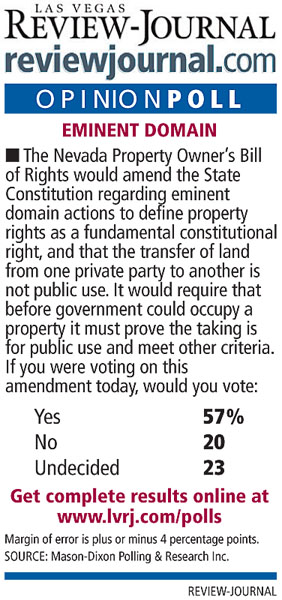Voters favor eminent domain limits
CARSON CITY -- Likely voters by nearly a 3-to-1 margin favor passing a state constitutional amendment in November that would prevent governments from using the power of eminent domain to seize private property and then turn it over to developers, a Review-Journal poll shows.
Of 625 registered voters who responded in the statewide poll, 57 percent said they would back Question 2, the eminent domain ballot question, while 20 percent opposed it, and 23 percent were undecided.
Mason-Dixon Polling & Research Inc. of Washington, D.C., conducted the poll for the newspaper. Voters were interviewed by telephone on Wednesday and Thursday. The results have a plus or minus 4 percentage point margin of error.
Men, women, Democrats, Republicans and independents and voters from all geographical areas of the state overwhelmingly backed the question to restrict the use of eminent domain.
Two years ago when the same question was on the ballot, it received support from 63 percent of voters.
But approval is required once again this November before the amendment can be added to the Nevada Constitution, which requires such amendments be approved twice.
Kermitt Waters, the Southern Nevada lawyer who put the question before voters, was pleased by the poll results.
But he said some people might not realize they have to approve the question twice and neglect voting on it in November.
"If they don't pass it the second time, it won't be in the constitution," Waters said.
Waters said he is concerned that if his proposal is not placed in the constitution, legislators would repeal laws approved in 2007 that restrict the use of eminent domain.
He sought to restrict the use of eminent domain in Nevada after a 5-4 U.S. Supreme Court decision in 2005 that allowed a city in Connecticut to take private homes and then sell the property to a developer so a shopping center could be built. Through the shopping center, the city secured additional property taxes.
Waters said the same type of situation has occurred in Nevada when cities seized private property and gave it to casinos and developers.
"That is not a justified public use," he said.
Since he prepared his proposal, Waters said there have been no attempts by local governments to use eminent domain for anything other than legitimate purposes, such as for roads or schools.
Because of their concern that his proposal could restrict even legitimate uses of eminent domain, a compromise was reached among Waters, legislators and Clark Commissioner Bruce Woodbury in February 2007.
Under the compromise, local governments still could seize private land, but only for a real public purpose. The owners of the land also could go to court if they feel the taking was inappropriate.
"Most people understand what public use is," Waters said. "Taking your house and giving it to (casinos) is crap."
After the agreement was reached, legislators passed bills that placed the compromise proposal into law.
At the same time, legislators drafted a new ballot question on eminent domain designed to put the compromise into the constitution. With legislative approval at the 2009 session, the new eminent domain plan would go before voters in 2010.
If the language of that question truly reflects the compromise, Waters said he will not oppose it in 2010.
Contact Capital Bureau Chief Ed Vogel at evogel@reviewjournal.com or 775-687-3901.

















